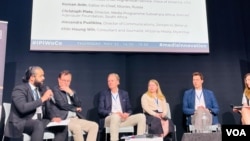Speaking at the International Press Institute World Congress May 25 and 26, four Voice of America journalists focused on global threats to journalists.
On the opening day of the IPI conference, Jessica Jerreat, VOA press freedom editor, moderated a conversation on the difficulties journalists face in covering elections in countries with the most restrictive press environments and where democracy is under pressure. Among the issues discussed was “media capture,” when governments, powerful interests or pro-government supporters buy up most media outlets and restrict them to positive coverage. Jerreat was joined on the panel by journalists from Turkey, Brazil, Poland, Kenya and India who detailed how disinformation, lack of trust, and regulatory or legal pressures are used to drown out independent voices and prevent balanced coverage of elections.
Jerreat, who leads VOA’s unique global press freedom coverage in 15 languages, was among four who spoke for VOA on panels that focused on journalists in exile, international disinformation and the use of cybercrime laws by governments to limit press freedom.
“Press Freedom is in our DNA at Voice of America,” said Acting VOA Director Yolanda López. “Our participation with hundreds of international journalists demonstrates our global commitment to this mission. An added benefit is that our reports and our editors are sharing ideas on media freedom with peers who are covering and facing threats in their countries.”
Afghan service chief Hasib Danish Alikozai shared details on his journalists’ pivot in the wake of the Taliban’s takeover of Afghanistan. Speaking on a panel focused on innovation and exiled media, Alikozai described the proactive efforts he and his team took to stay ahead of the Taliban’s effort to rein in independent media. Alikozai was joined on his panel by reporters in exile from Myanmar, Russia and Belarus.
In a closing session on the first day of the conference, senior VOA Africa Division editor Salem Solomon took part in a debate about how disinformation and AI technology is disrupting the media environment.
“Disinformation (in Africa) ... has expanded to an industrial scale,” Salem told the panel. Discussing Russia's disinformation efforts, Salem summarized the view of experts that the Putin regime’s goal is to prop up authoritarian governments, undermine democratic processes and promote mistrust of the West.
On the second day, Ayesha Tanzeem, VOA South and Central Asia Division director, joined a panel discussing the impact of cybercrime laws and regulations on media freedoms.
“Censorship is not new,” said Tanzeem, but governments are using the digital space with laws and regulations that foster self-censorship by journalists.
IPI is one of the oldest global media freedom organizations. More than 350 journalists, newsroom leaders and civil society organizations from across the world attended the conference in Vienna, Austria.







